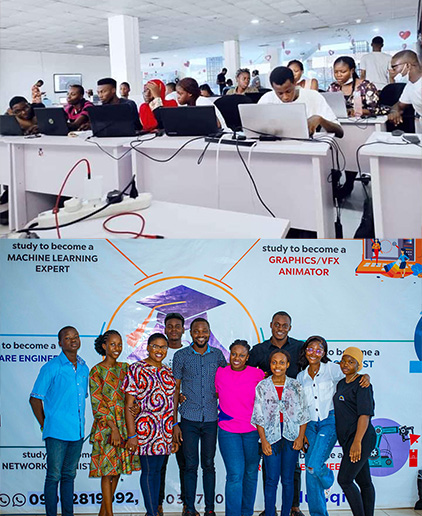Digital Literacy
This course is designed to prepare you for success in a modern world full of computers—not only the traditional computers such as desktop and notebook PCs but also computers that you interact with in other places too, like your bank’s ATM or your employer’s computerized cash register. In this course, you will learn about the technologies that drive our computerized society, including the Internet, Wifi, and local area networks (LANs).

Course Content
Digital Literacy
Taking this course will help you become a digitally literate person—that is, someone who understands how computer technology fits into our modern society and knows how to navigate a variety of computing environments. The syllabus covers the following:
Please note: The tuition fee varies by campus. For guidance, please ask the front desk.
Introduction To Computer
Here, you start with the basics. Computer fundamentals and operating systems. You’ll compare major operating systems and learn what types of devices each operating system is designed to run on. You’ll learn how to navigate in Windows, Mac and Linux operating system too, including how to run applications and manage files. You’ll learn about the physical parts of computers, including input, processing, output, and storage. You will find out about the main types of application software and what each type is useful for. You’ll learn how to choose, install, update, use, and remove applications in lastest Windows operating system.
Productivity Programs
Productivity programmes are tools you can use to create documents, presentations, tables, charts and graphs. This course explores the most common applications used in business, in education, and at home. In this course, you will learn the features of various productivity programs such as word processing software, spreadsheets, and databases. You will also learn how to select the right software to cater to your needs.
Internet and World-Wide-Web
You will learn about modern internet experience and how to use a web browser to find information on the Internet.
Networking concepts
You will find out how computer networks work, including the hardware and software required for them.
Digital Lifestyle
You will learn how to communicate online in a variety of ways, including email, instant messaging, video chat, audio, and web conferencing.
Digital Citizenship
You will learn the etiquette standards and customs of the online world and the legal and ethical issues involved in worldwide online computing.
Security and Privacy
Safe computing (Security and Privacy): You’ll find out what the dangers are in using the Internet and other networks and learn methods of protecting your privacy and safeguarding your computer and its data. This course explains the ethical and legal issues related to internet usage.
Payment mode for Physical class
Duration: 2 Months
Amount: ₦100,000
Payment Options:
- Payment Upfront: ₦100,000 ₦85,000 (Upfront 15% off)
- Pay Twice: ₦80,000 ₦45,000 (Twice 10% off)
Course: Digital Literacy (With Office Technology Management)
Duration: 6 Months
Amount: ₦500,000
Payment Options:
- Payment Upfront: ₦500,000 ₦425,000 (Upfront 15% off)
- Pay Twice: ₦250,000 ₦225,000 (Twice 10% off)
- Pay Every 2 Months: ₦166,667 (Every 2 months, No discount)
Payment mode for international students
Amount: $99
Duration: 6 Months
Amount: $499
Payment Options:
- Upfront Payment:$117 (Monthly)
- Pay Twice: $275 (Twice 10% off)
- Pay every 2 Month: $200 (Every 2 months) (No discount)
Payment mode for Virtual students Nigeria
Duration: 2 Months
Amount: ₦50,000
Course: Digital Literacy (With Office Technology Management)
Duration: 6 Months
Amount: ₦250,000
Payment Options:
- Upfront Payment: ₦250,000 ₦212,000 (Upfront 15% off)
- Pay Twice: ₦125,000 ₦225,000 (Twice 10% off)
- Pay Every 2 Months: ₦83,334 (Every 2 months) (No discount)
Physical Class:
Standard (2 hours/day, 2 days/week)
Extreme (2 hours/day, 4 days/week)
Location (Ogbomoso | Ibadan | Abeokuta | Osogbo).
Virtual Class:
5 hours/day | Weekends | (Instructor-led and interactive)
Kindly note that due to varying costs of operation in different locations, SQI campuses have different payment policies.
Learn from the best
Experienced Instructors
Our mentors are experienced, working professionals who coach students through roadblocks during their course while sharing key problem-solving strategies that will set them up for success and continual growth on the job.




Anthonia Ayinla
DGL EXPERT

Grace Damilola Aderinto
DGL EXPERT

Olubunmi Olawole
DGL EXPERT
WHAT PEOPLE ARE SAYING ABOUT US
Testimonial
Hear what our current and past students have to say about their experience at SQI
Why Study at SQI?

Project Based Learning
This course is practical, hands-on learning. Practice and apply knowledge faster with real-world Web Development projects you can show off

Expert Instructors
Get to interact with a different mentors and draw from their loads of experience.

Physical & Virtual Class
You can now choose physical class experience or online classroom and learn from anywhere in the world.

Free access to our hub and community.
You will have access to our fully functional hub for co-working and working on projects, assignments and even begin a start-up.

Access to study materials
Students have access to prerecorded videos and resources they can make use of to further solidify their knowledge.

Job Opportunity
78.5% of our students found secure employment within three months of graduation. Students leave from learning to getting job roles.

Alumni Support
Our students have access to alumni who currently work at top tech organizations in the world such as Google, Microsoft, Interswitch etc.

Certification
Be certified by an accredited and globally recognized institution. SQI got its accreditation in Sept 2021 from the NBTE, Nigeria.
Campus Tour
Ibadan
Campus Tour
Ogbomoso
FAQ
Frequently Asked
+ Who Can Take This Course?
Anyone and everyone that has a passion for learning and starting a career in Web/Software development. This includes Undergraduate students, Graduates, Workers, Youth Corpers, and anyone who longs to becomes digitally literate.
+ Do I get certified after my training?
Yes, you’ll be certified by an internationally recognized and nationally accredited institution.
+ I am a student, and we are currently on holiday, what happens when my school resumes?
Students in school can pause their training when they resume and continue during the next break.
+ What else do I need to start this course?
Taking this course will require that you have access to a personal laptop
Start Now
Join our next cohort!
Secure a career in a highly in-demand, growing field with our Software Engineering program.
SQI has taught over 6,000 graduates across different countries. 78.5% of our students found secure employment within three months of graduation.

